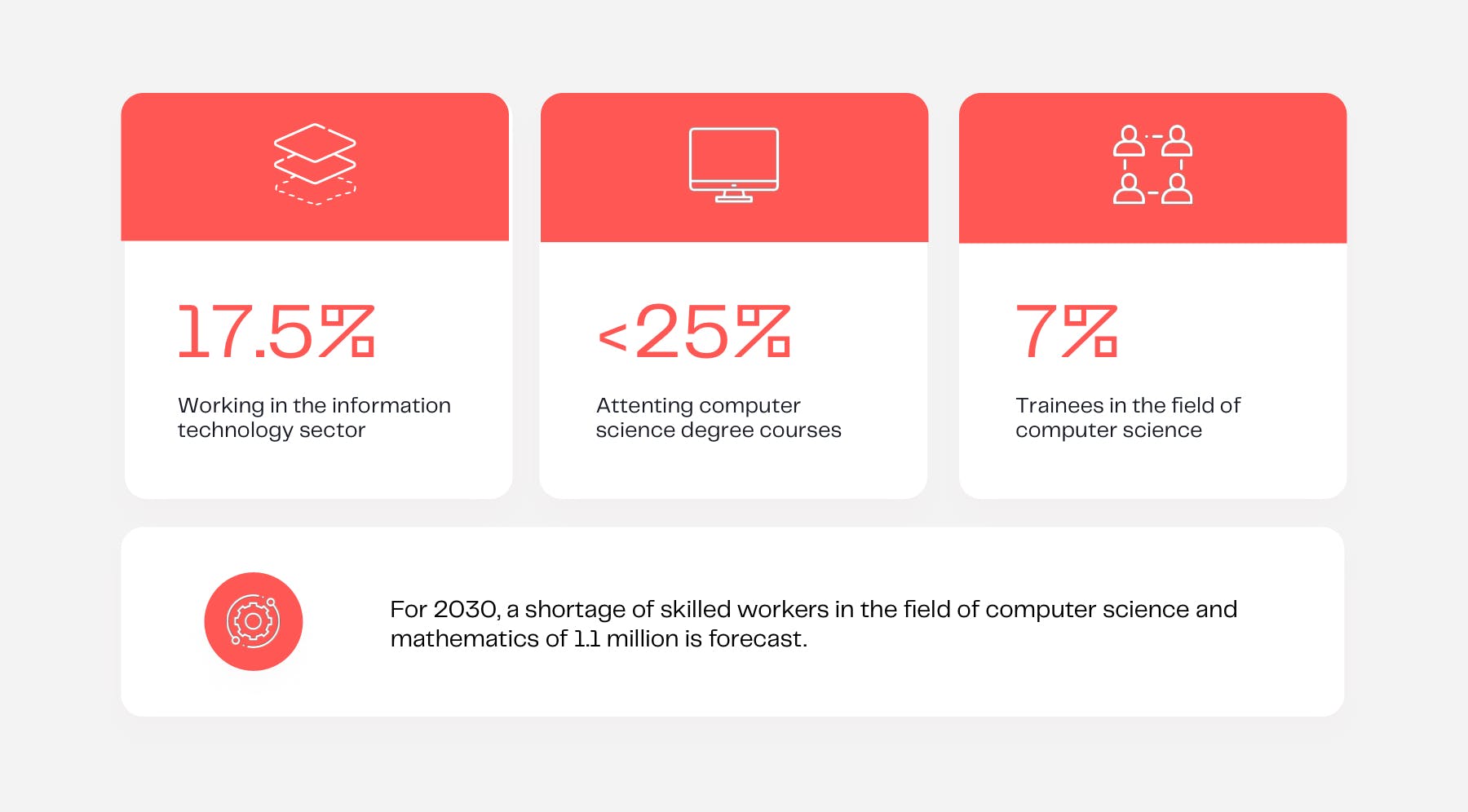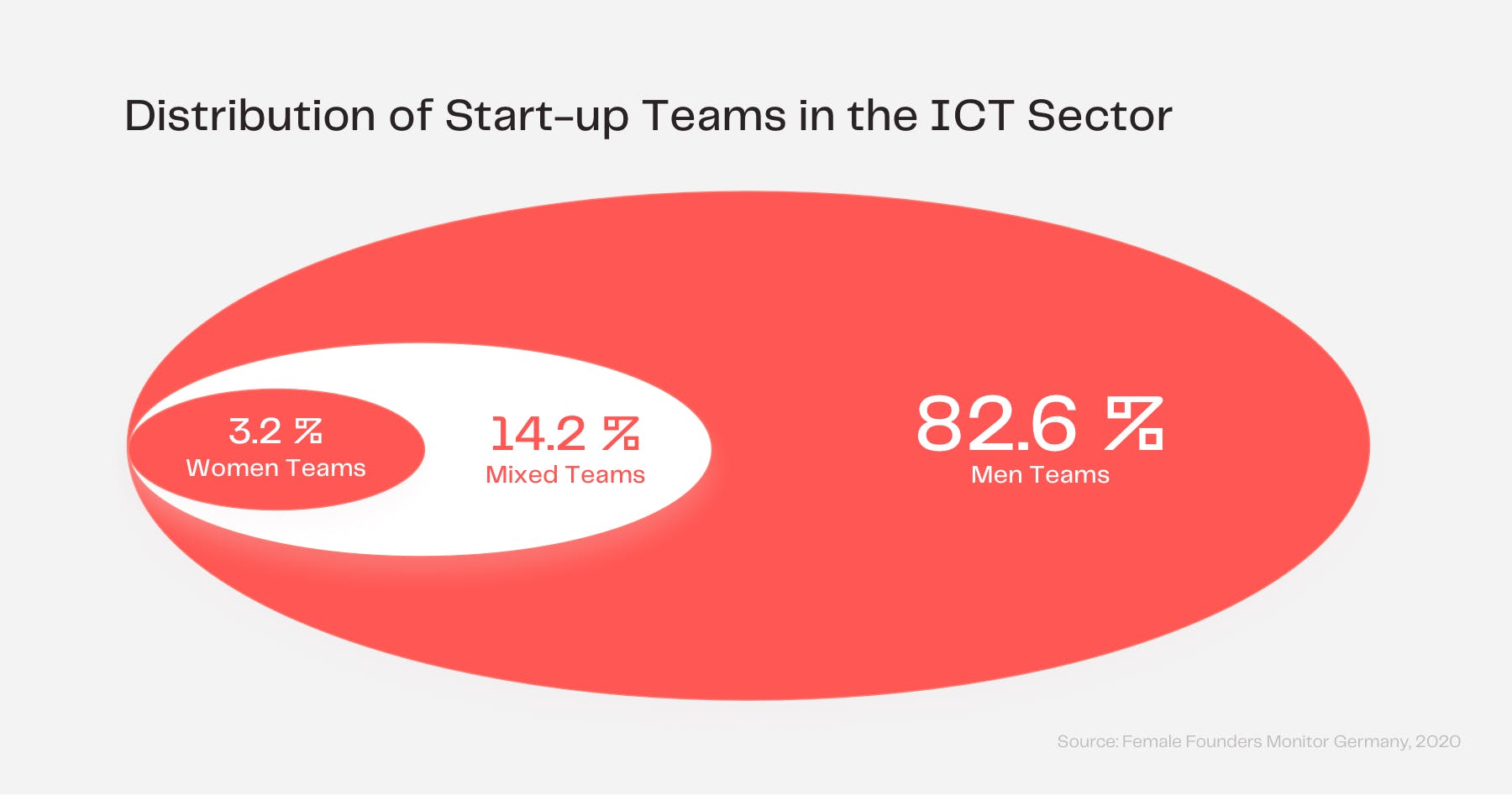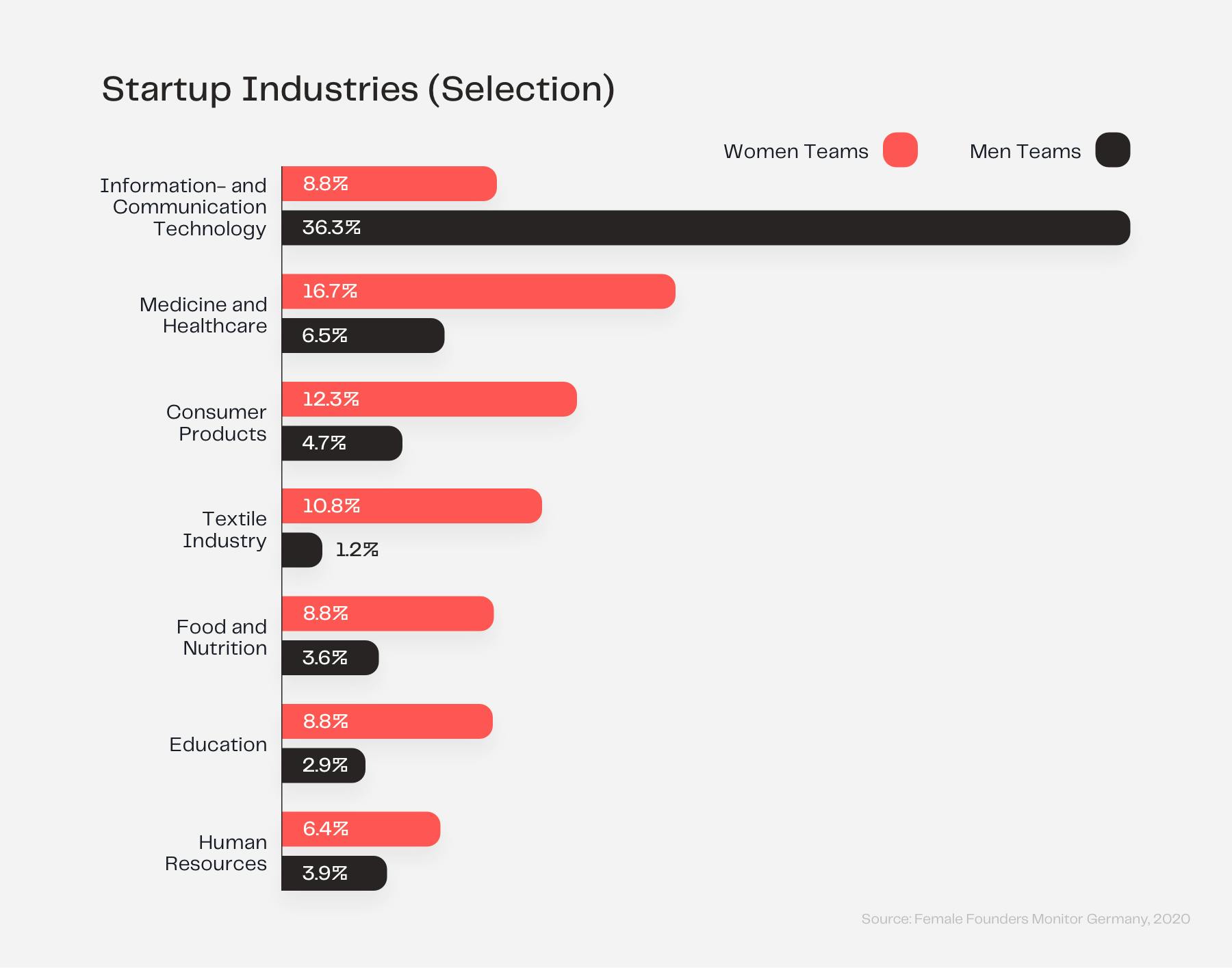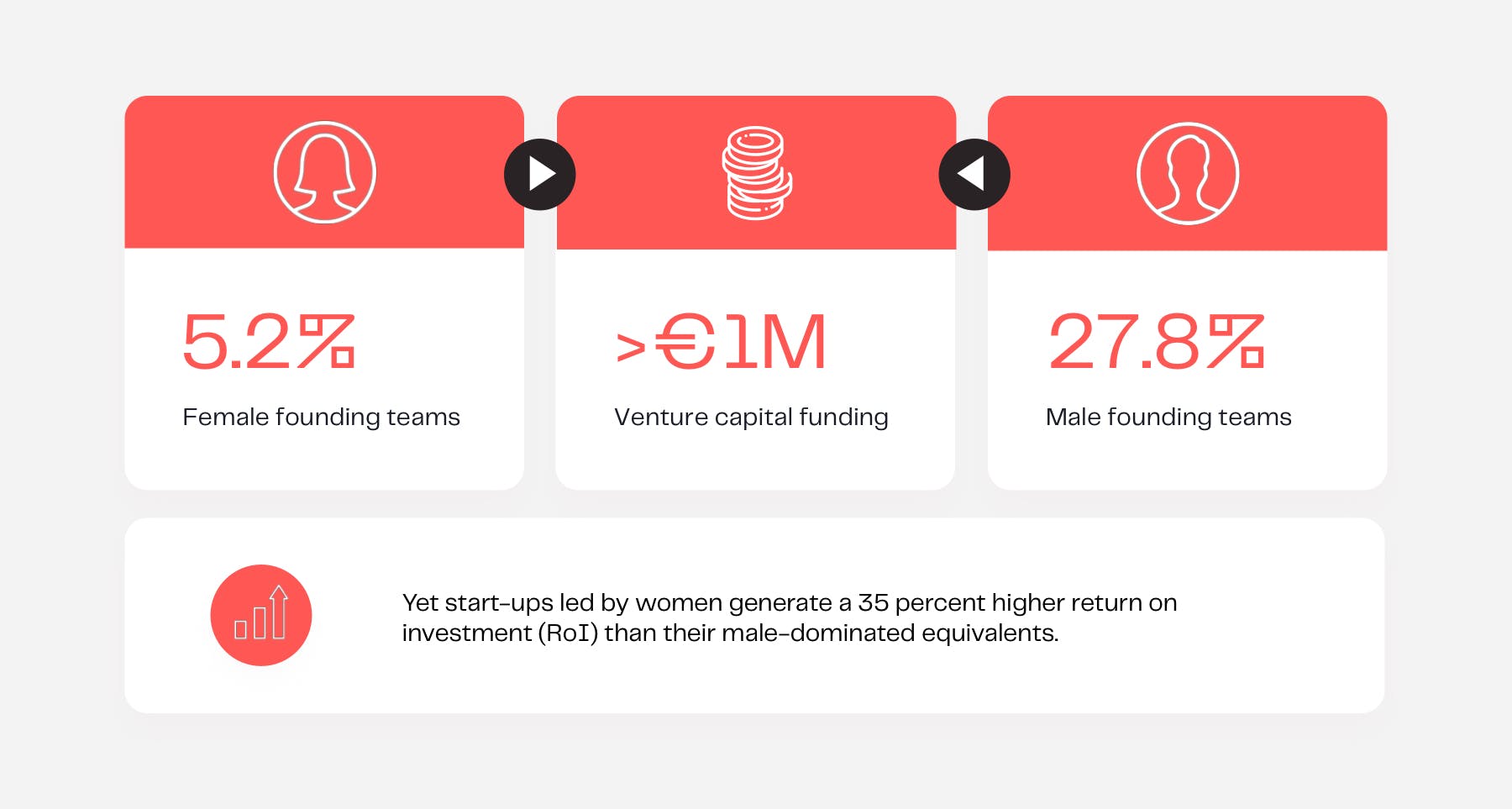Women in the New Era of Technology

Women Can Do It: How To Attract More Female Talents Into Tech
Few industries are as far ahead in terms of diversity as the tech industry. Different backgrounds, origins, education, and generations – the industry is international and heterogeneous. If only one important aspect of diversity were not missing: Women.
Females are still clearly underrepresented in the tech industry. Yet they are urgently needed to accelerate digitization, drive technical innovations and, last but not least, compensate for the lack of IT specialists.
Although the problem is not new, too little has changed in recent years. There are many initiatives to change this. But what is the reason that progress is so slow?
One challenge is that there are many biases against tech-related jobs. Stereotypes and myths might keep some women from even considering joining the tech scene:
Myth #1: IT is only driven by technology.
This may have been true in the past, but today it is only a part of it. There are also areas like project management and social elements, digital marketing and much more. "Tech industry is not just about coding," says Akansha Verma, front-end engineer and Scrum master at NBT. "There are many verticals where women can go into the tech industry, find their passion and build up from there." And sometimes this is exactly what intensifies the desire for technology: "I have seen many women who were into marketing, customer service, etc. and made their way to the engineering team and found their ultimate passion in coding."
Myth #2: IT is not very creative.
This is also a fallacy. Being creative means finding a non-obvious answer to a question, and a non-obvious solution to a problem. And that is what, for example, a software developer does. As important as the code itself is that she or he understands the requirements and can translate them into an application. “To me, tech is creativity, tech is inspiring, tech is optimism,” says Sera Akinci, venture builder at NBT and board member of Enclave Networks.
One important pulse for creativity is curiosity, and this is what drives Amal Gmar. She is a full-stack engineer at Vitreo and has been gifted with mathematics and problem solving since her academic career. “I am curious to know what lies behind technological innovations. I prefer to practice the things I like, which is why I chose IT,” Amal explains.
Myth #3: IT is a lonely business.
The cliché of the nerd sticks to the tech industry: pale men in hoodies and glasses who sit in front of their computers day and night and code, intelligent, but socially isolated. But tech does not necessarily take place in a quiet room. It is collaborative, responsive and interactive. Communication and teamwork skills, along with organizational talent and empathy are among today's soft skills.
"We work in an agile environment," Akansha Verma describes her work, "and I help the team to streamline work and carry out sprint activities such as planning, retrospective, and sprint demo which helps to achieve not only team goals but brings full transparency to our venture owners of the progress."

Women In Tech: What Drives Them?
Akansha Verma, however, had a soft spot for technology even in her school days. She found computer science more interesting because of the problem solving and innovative solutions and she continued her studies by pursuing a bachelor's and a master's degree in computer science. "I think the tech industry is so diverse and offers tremendous opportunities to grow," she says. "You don't have to commit to one thing for the rest of your career. You can constantly explore and learn depending on what motivates you, whether it's in artificial intelligence or machine learning, for example, or recognizing sentiment towards emoji used in social media apps, etc."
The versatility of tech careers also fascinates Fernanda Ivatiuk, Venture Developer at NBT. "I think a lot of women are not aware of the opportunities that exist in the tech industry these days. We see so many jobs that didn't exist a few years ago, and that scenario is changing very fast, creating a lot of opportunities for people with a non-technical background."
She herself did not end up in the tech scene in a direct way. "I was an entrepreneur in Brazil and I was always studying the market and looking for new opportunities," she says. "It was inevitable to go into the tech world as a next step to develop my business and build a start-up in education technology as a co-founder. I also always liked the start-up mentality that you can develop and test things quickly. That allows you to build scalable products – and also to dream bigger."
Amal Gmar also likes the challenging aspect of tech: "In our lives, we have to do something for ourselves every day and also learn something new every day. That's why IT can be the right choice to challenge ourselves and be proud of what we do."
How Can We Get More Women Excited About Tech Topics?
Equality does not start with the choice of career, but at home and especially at school. There is no reason – neither social, nor psychological, nor biological – that predestines men ahead of women for STEM professions. It's about sparking interest. “We have been programmed into fitting into certain boxes, doing certain things without even really questioning it” – and this needs to change, according to Sera Akinci.
Tech Belongs In Primary School
That's why it's important to include innovative topics in education at an early age. These topics can even be fun – just think of these areas that are virtually predestined for interaction:
- Blockchain
- 3D printing
- Drones
- Internet of Things (IoT)
- Robotics
- Virtual Reality
- Augmented Reality
- Artificial Intelligence
Computer science should be a compulsory subject, just as mathematics or science is. After all, technical innovations not only change our working world but also have a major impact on our society. Other countries are leading the way: In the UK and Australia, five-year-olds are already learning to code. Why not?
If over 50 percent of the world's population are women and use technology, why shouldn't they play a major role in developing it? Amal Gmar encourages women to take a look at the trend of technologies these days and how they rule the world.

We Need Role Models And Mentors
The world's first programmers were female. In the USA, software development used to even be considered a female profession. Ada Lovelace, Grace Hopper and Jade Raymond are among the visionaries of computer science – and yet many young people are no longer familiar with them.
There are only a few, but very well-known and present women at the top of IT companies, just think of Meta/Facebook COO Sheryl Sandberg or ex-Yahoo CEO and "public face" of Google, Marissa Mayer. German top tech women include Sabine Bendiek (SAP, previously CEO of Microsoft Germany), Martina Koederitz (Global Industry Managing Director at IBM) and Doris Albiez (IBM and Dell, among others).
Fernanda Ivatiuk is convinced of the power of good role models. "When you hear some story about real-world people who did extraordinary things like starting a tech company and succeeding, this can serve as an inspiration for other women who would not believe this could even be an option. We need to share more success stories." Visibility is crucial for strong, female role models who can boldly come forward from the second or third row because success is not a question of the hierarchy.
Mentoring also plays a big role. "I have been fortunate to have amazing guidance from early days in my school and an amazing mentor who taught me the value of team building," says Akansha Verma. Both were women. Not everyone is so lucky. That's why we need more of it. Mentoring programs, committed parents who present their own technical profession, collaborations with companies, competitions, science clubs, girls' days or internships.
Generation Z Will Become A Game Changer
People from Gen Z have been entering the labor market for two years now. Their women will mean a major turning point in tech professions because this is the first generation to be digital natives throughout. They were born into the world of technology. And so it is that almost 1 out of 3 Gen Z women learned to code before they were 16 years old, compared to 18 % of women from previous generations. "We grew up with technical topics and have no reservations - simply because smartphones and apps have been part of our lives from the very beginning," says Leonie Adams, born in 1996 and thus part of Gen Z, who is working in venture marketing at NBT since October 2021.
Hopefully, a new generation of female founders is growing up here. For the time being, they are still in the minority. In general, women are less likely to found companies, and certainly not in the tech world.


Women Still Have A Harder Time Getting Funding
One reason for this: the venture capital world is male-dominated. And men prefer to give their money to men. Fortunately, more and more business angels and VCs are now entering the market who explicitly want to support women and female teams.
These include Gesa Miczaika and Bettine Schmitz. Their Auxxo Female Catalyst Fund only supports women's teams or mixed teams, and the founders must also hold at least 20 percent of the founders' shares. Purely male teams do not receive any money.
60 percent of the investors for the new Auxxo Fund are women – including well-known female entrepreneurs such as Verena Pausder, Douglas boss, Tina Müller, or supervisory board member, Simone Menne.
“It was important for us to attract many women as investors. Only once there are more female investors in the VC business will female founders also get enough capital,” says Miczaika, who is also a board member of the German Startup Association.

But still, female founders have a harder time finding their place. One reason for this is communication and lack of networking. According to the Female Founders Monitor 2020, women seem less inclined to network locally. This lack of networking is certainly a crucial factor that affects all aspects of successful founding. After all, without firm integration into the start-up network and access to investors, the chances of success for female founders drop drastically.
Venture studios, incubators and accelerators offer both network and capital and provide important support because they have the complete know-how in matters of business development, project management, marketing and finance and provide the corresponding resources. Ideally, the venture developers have an entrepreneurial background themselves – for example, Fernanda Ivatiuk and Sera Akinci do. “Having start-up experience allows you to transfer your valuable knowledge in all areas,” Sera says. Knowing the same challenges and difficulties pushes the founders in the right direction.
Diversity Is Key – And A Challenge
More women in the tech sector also mean we have a diversity of thought and attitudes, and that's a win-win for everyone. Companies that are characterized by a high degree of diversity have a greater likelihood of being more profitable than average. This correlation is particularly strong for the proportion of women in top management (board plus two to three levels below). The McKinsey study "Delivering Through Diversity" reveals: Companies that perform particularly well here have a 21 % greater probability of being more successful than average. In German companies with a high proportion of female executives in top management, the probability of above-average business success even doubles.
But to get there, companies must also work on themselves and their corporate culture as women still face obstacles:
Gender bias
Sadly, this is true, especially in C-level management. It is challenging to find and make your place, but not impossible. “For many years early on, I was the only one in my school attending computer science class, and the only one in the engineering team working on multiple projects,” says Akansha Verma. Instead of finding some other class or other sectors to work with women, she accepted the fact and continued to pave her way. ”As a woman, you may have to work harder, but if you believe in yourself, you can do it!“
Work-life balance
For many women, this seems to be a concern of having the right work-life balance, especially when they have a young family. Although it has started to change in the last 5 years with companies being more aware of creating a culture that embodies work-life balance, the last 2 years have created tremendous opportunities with flexible hours and remote working.
Create equal job opportunities
Bias in the recruiting and interview process brings challenges for women to get into the tech industry. Unfortunately, many women do not get the opportunity to advance professionally. Currently, the scenario seems to be shifting a bit with more resources available such as online courses and hackathons to offer a window to get their feet in technology. So, a degree is not always required.
Recognition through a gender-neutral reward scheme
Equal pay for equal work can be helpful for companies to not only recruit women but also retain them in general. Organizations should be transparent about gender diversity and not just promote the thought without accountable actions.
New Work: Focus on empathy and soft skills
Companies need to allow employees – women and men – to trust their gut feelings. “I’ve heard so many stories about women having the so-called ‘impostor’s syndrome’, leading them not to apply for a certain job or a promotion,“ reports Fernanda Ivatiuk. In her opinion, people need to talk about it more often. “By sharing, we can create a network of women helping each other overcome it. We should trust our knowledge and instincts and not let anyone make us believe we cannot achieve something.“
Conclusion: Women Can Do It – And They Should!
The tech industry still has a long way to go towards equality and equity in the workplace. But the signs are good: “I believe there has never been a better time than the one we are living in to get into the tech sector,“ Fernanda says. “Opportunities are booming and people are really valued not only for their academic background but also for their skills.“
But how to get into it?
Anyone can start with a non-technical role and gain experience and find their passion to build up from there, states Akansha Verma. Her advice: “Examine your problem-solving aptitude, learn basic computer science concepts and start applying it. Tech is constantly evolving, so keep updated with cutting-edge technologies. If you are already a working professional in another field, then analyze how you can use that experience in the tech industry. Do not limit yourself, be open to try out different things, speak up, and don’t judge yourself.”




